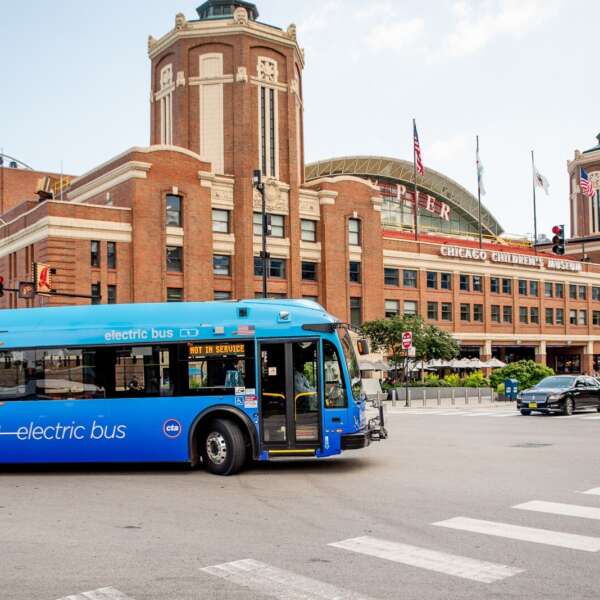RTA mobility pilots explore solutions to first-mile, last-mile commute challenges
May 10, 2021
May 10, 2021

Chicago resident Anni Kask used to spend hours every week driving between her home near Wrigley Field and her office in suburban Bannockburn. On a Cubs game day, the drive home could take as long as three hours.
Although she lives close to the Ravenswood Metra stop, she wasn’t sure transit was an option for her reverse commute because her office is about five miles from the Highland Park station.
Exploring solutions to these first-mile or last-mile challenges is one way the RTA is committed to helping transit Stay Competitive, which is one of the goals of the agency’s 2018-2023 regional transit strategic plan, Invest in Transit. “Last mile” refers to the gap between transit and a rider’s final destination, such as work or school.
To support that goal, the RTA has funded, and is funding, several mobility pilots around the region, including one that helped Anni stop driving to work and take transit instead.
Through a partnership between the RTA and GlenStar Properties, the landlord of the office complex where Anni’s employer is located, Anni participated in a pilot program that paid for her to use Lyft to connect from the Metra station in the suburbs to her office. For Anni to pay for that Lyft ride herself would likely be about $10 each way, on top of her Metra ticket.
“It was such an amazing incentive and I didn’t have to worry about driving or sitting in traffic jams or getting stuck behind accidents,” Anni said. “While my coworkers were sitting in traffic waiting to get home, I would just get on the train and read, relax, or listen to music.”
Anni’s commute trips were among more than 6,000 served by mobility pilots in Bannockburn and Oak Brook, two programs that are described in a new RTA report about how the two pilots worked and what the agency learned while partnering with private companies to meet the needs of riders. The RTA found that working with Transportation Network Companies (such as Uber or Lyft) can be a cost-effective tool to serve a low-demand, sprawling last-mile service area, among other lessons learned.
“Having this kind of option offered to you is fantastic and I think it would be a great incentive for a company to join this location or for new employees to join a company,” said Anni, who has been working from home for about a year due to COVID-19 but hopes to return to transit soon.
View details on the other ongoing mobility pilots the RTA is supporting around the Chicago region in an interactive story map.
Subscribe to our Newsletter
Related Articles
 How to navigate the Democratic National Convention using public transportation
How to navigate the Democratic National Convention using public transportation
The Democratic National Convention is coming to Chicago’s United Center and McCormick Place August 19-22, 2024, and with it will come roughly 50,000 visitors...
July 25, 2024 How to use transit to explore museums in the Chicago region
How to use transit to explore museums in the Chicago region
The Chicago region is home to countless accessible cultural and educational amenities including 150 museums across several counties. The most cost-effective ...
July 10, 2024 RTA welcomes summer 2024 interns
RTA welcomes summer 2024 interns
This summer the RTA welcomed six new interns from Chicago-area universities. The interns work in various departments including Communications, IT, Strategic ...
June 27, 2024 Four months into the Access Pilot Program, over 3,000 Metra riders experiencing low incomes enrolled for more affordable fares
Four months into the Access Pilot Program, over 3,000 Metra riders experiencing low incomes enrolled for more affordable fares
On February 1, RTA launched the Access Pilot Program in partnership with Cook County and Metra, extending reduced fares to eligible Metra riders experiencing...
June 13, 2024 How to use transit to celebrate Pride Month in the Chicago region
How to use transit to celebrate Pride Month in the Chicago region
June is Pride Month, a time to honor and celebrate Lesbian, Gay, Bisexual, Transgender, Queer and Questioning (LGBTQ+) individuals in the United States. The ...
May 31, 2024 How to use transit to enjoy summer in the Chicago region
How to use transit to enjoy summer in the Chicago region
Summer weather is here and although the season can feel short for many Chicago residents, there is no shortage of fun to be had. To celebrate the sunshine, t...
May 24, 2024